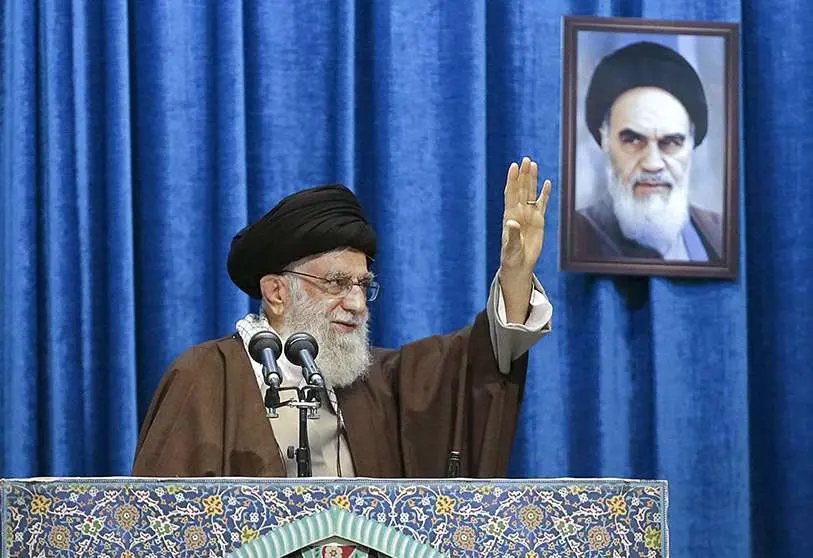Everything or Nothing!

In the views of the political analysts and even the negotiators from the 4+1 (China, Germany, France, Russia, and the United Kingdom), it was incomprehensible why the Iranian regime, which had negotiated for six sessions and had reached concessions, had decided to ignore the previous gains. Instead, they bring new expectations and demands to the negotiation table. Iran's new demands are not only exaggeratory but impractical.
It is now public knowledge that the Iranian regime is trying to buy time to produce 90% enriched uranium. The regime could be on the verge of manufacturing a nuclear bomb with the necessary techniques. However, this does not explain all the dangerous intentions of the Iranian regime.
To understand the behavior of the Iranian regime, we must go back to 2019, when a new chapter emerged. I do not mean the rage of the insurgent youths, who were fired at by Khamenei's direct order, resulting in thousands killed, detained, and injured. Instead, in 2019, a new social phenomenon announced its formation in 2018 and reached a new level of maturity within 2019.
The political aspect of the 2019 uprising is far more potent than its economic nature. This new social phenomenon consists of the middle class pushed down and impoverished. A class that is entirely self-aware and knows what it wants. This class wants to change and overthrow the existing structure of the ruling mullahs.
Khamenei had realized the message of the 2019 uprising better than anyone else, and as a result, he manifested his new strategy. In Iran's presidential election in the year 1400 (Persian calendar, equivalent to 2021), a large majority of the candidates were disqualified and could not announce their candidacy, including the former speaker of parliament and his adviser Larijani. Khamenei wanted no serious candidate to come in the way of his favorite candidate, Ebrahim Raisi, who he hopes to bring the volatile social and economic situation in Iran under control.
The installment of Ebrahim Raisi should be described, first and foremost, as a war formation aimed at countering widespread uprisings while still having an open hand in its nuclear and missile programs, regional warfare, and international adventures. If Iran's Supreme Leader had been serious about reaching a nuclear agreement with the West, this could have been achieved before the end of Rouhani and Zarif's tenure. In this regard, Ebrahim Raisi was the most obedient person for Khamenei.
Three weeks ago, Khamenei, the commander-in-chief, promoted the Iranian police force to the organizational position of the army and the Revolutionary Guards. Unlike all the world's countries, he placed all of Iran's security and military forces under his command. The commander of the police force is on the same level as the commanders of the army and the IRGC. In addition, the commander-in-chief of the police force, who was once a minister, will be promoted to the same position as the first vice president. More importantly, a police force like the IRGC will form a new intelligence organization parallel to the IRGC and the Ministry of Intelligence. New prisons and interrogators will be employed in the new intelligence agency. So far, at least 20 members of the Revolutionary Guards are members of Ebrahim Raisi's cabinet.
Furthermore, the existing governors are being replaced by new governors affiliated with the IRGC. Going through so many structural changes, Khamenei hopes to tame the ever-explosive society of Iran. That is why it is fair to say that no one in the regime understood the message of 2019 except Ali Khamenei himself.
Foreign Ministry spokesman Khatibzadeh has stated that the agreement with the Western countries is either on everything or nothing this time around. For a deal to be reached, the regime gives up acquiring an atomic bomb or developing missiles and ends its regional influence. Iran's suffocating economy has to find a way to breathe, but even the possibility of lifted sanctions will bring the regime to the table.
After the 2015 JCPOA, $150 billion was handed to the Iranian government. It was allowed to sell its oil and earn a handful of money. Despite such huge windfall, during 2017 and 2018, Iranian society witnessed a surge in social uprisings ignited by poverty. Khamenei intends to apply maximum security pressure on society in fear of possible upcoming widespread uprisings.
The Iranian regime wants everything, the atomic bomb and the regional adventures, to cover up the repression inside the country that has existed for the last four decades. That is why the regime insists on a replica of the 2015 JCPOA.
Suppose the Iranian regime wants to comply with the agreement and demands of the P5 + 1. In that case, it has to comply with the other demands. Similarly, the regime has to justify the deaths of close to 500,000 people due to Khamenei's ban of the COVID-19 vaccines. Most importantly, the regime has to respond to the ever-growing expectations of the Iranian people, demanding a better life. In this scenario, the regime is digging its own grave, and the people of Iran will be more determined to push this regime into its grave.

